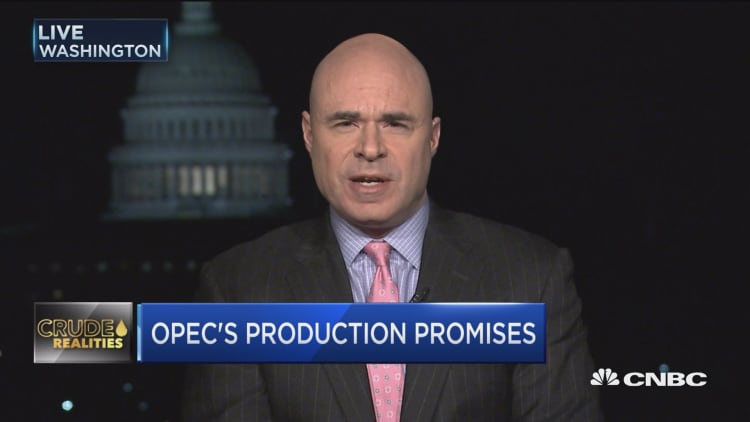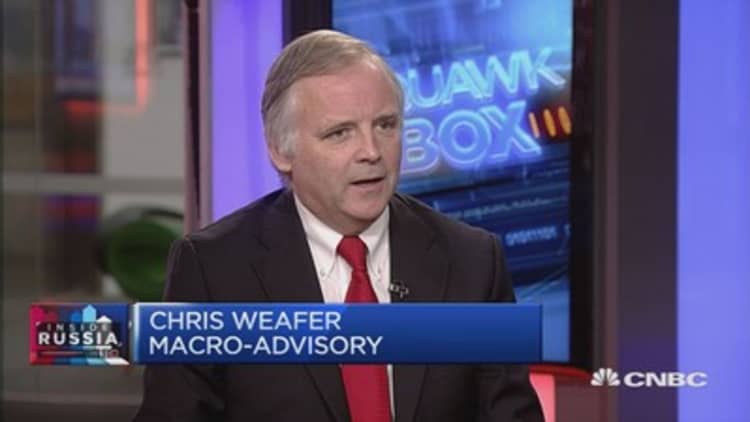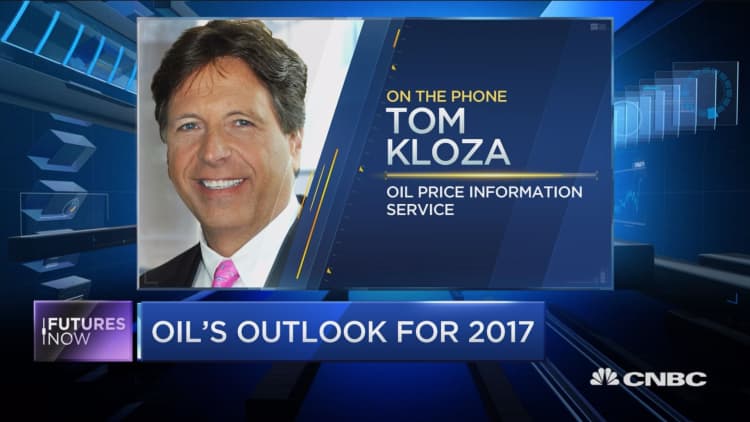
OPEC's first oil output cuts since 2008 take effect next week, but analysts see little chance members of the producer group will stick to their quotas.
"It's inevitable. Somebody's going to cheat," ClearView Energy Partners managing director Kevin Book told CNBC's "Squawk Box" on Friday.
"You get until Jan. 21 to believe your hoped-for outcomes and then you converge with reality. Historically OPEC always blows past its targets," he said, referring to the date the cartel's monitoring committee first meets.
The Organization of the Petroleum Exporting Countries agreed last month to cut production by 1.2 million barrels per day in a bid to reduce huge crude stockpiles that have built up during a more than two-year price rout. Other producers committed to reducing output by a total of nearly 558,000 barrels a day, with about half of the cuts coming from Russia.
OPEC members do not exceed their quotas by much if one averages the cheating over time, but it will take a big cut this time around because inventory levels remain very high, said Book, who heads ClearView's commodities research team.
He also dismissed the notion of "ROPEC" — coordinated action by OPEC and Russia — as a myth.
"We've been waiting to see this come through for decades. Is this going to be the time? Probably not this time either," Book said.

Russia is widely seen to have ignored its quota the last time it vowed to cut in 2001. Some analysts say Russian Energy Minister Alexander Novak's statement on his country's contribution to the current round leaves Moscow plenty of wiggle room in terms of when its producers will begin cutting, how much they will cut and their capability to cut.
"Energy Minister Novak, even yesterday, did sort of leave a get-out-of-jail-free clause by saying Russia would look at the cuts, but within technical parameters," Macro-Advisory senior partner Chris Weafer told CNBC Europe after the deal was struck earlier this month.
"It's possible that what the Russians are looking at is saying, well, we were planning to raise production by 300,000 barrels in the first half of next year. We now won't do it. Q.E.D., that's our contribution. We've seen that before."
Oil price gains capped
Book predicted that pessimism will soon wash back into the market as crude supply levels remain high. But OPEC could begin talking up a second reduction in May as the six-month program of cuts expires, he added.
U.S. crude's rise above $50 a barrel allows more American drillers to make money, so price gains may be capped going forward, Book said. Analysts warn further gains would lead to more U.S. production and a subsequent price crash.

Stephen Schork, editor of The Schork Report, on Wednesday also told "Squawk Box" oil prices have likely topped out in the $53 to $55 a barrel range due to the threat of more U.S. supply coming back into the market. He too warned that OPEC supply will remain too high to balance the oversupplied market if the cartel only achieves 60 to 70 percent compliance with cuts.
Alex Dryden, global market strategist at JPMorgan, told CNBC he expects roughly 80 percent compliance.
Tom Kloza, global head of energy analysis at Oil Price Information Service, forecasts 70 percent compliance, but he told CNBC on Friday that would actually only equate to a cut of about 700,000 to 1 million barrels a day. That is because the cartel "plays some games with the numbers" and is reducing from abnormally high levels.
The oil price rally may have a little more room to run because markets typically see an influx of new money from investment funds at the start of the year, Kloza said. However, crude is "pretty fairly valued" for the next 12 or 24 months, he added.
Rising production in Libya, which is exempt from the OPEC cuts, as well as the United States and Brazil could upset a "Goldilocks scenario" for oil bulls in which the cartel delivers a high degree of compliance, ClipperData's head of commodity research, Matt Smith, told "Squawk Box" on Tuesday.
OPEC and non-OPEC producers have begun notifying their customers of shipment cuts, lending some credence to their commitments.


